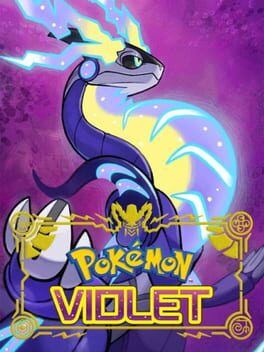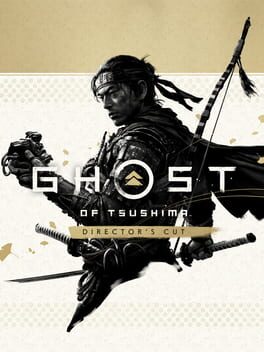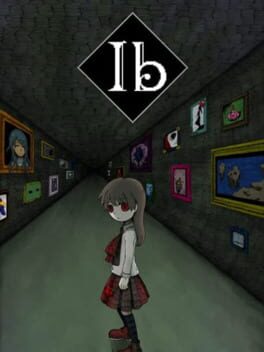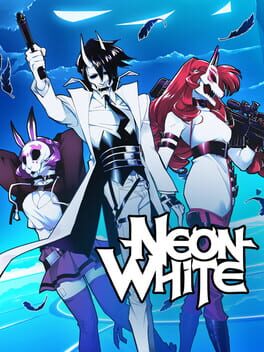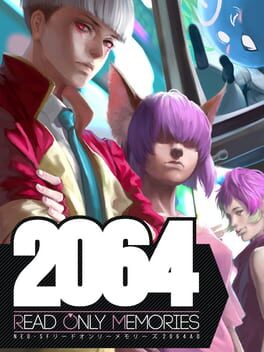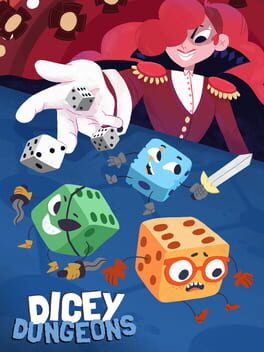riotkiwi
215 Reviews liked by riotkiwi
Club Penguin
2005
Elden Ring
2022
La cúspide de los Souls, tal cual. Si nunca has tocado la saga y te interesa mínimamente, éste es tu juego. El mundo abierto le sienta de maravilla, tiene contenido a puntapala, artísticamente es una cosa de otro mundo y la jugabilidad es un auténtico vicio. De no ser por God of War Ragnarök, sería mi GOTY personal.
Persona 5 Royal
2019
There were some things in my video game canon that felt absolute. That were either set in stone by the truth of their existence, or by my stubbornness to consider an alternative.
"Final Fantasy IX is my favourite JRPG" was one of those absolute truths. I've played loads of JRPGS since I first played FFIX as a 10 year old. I've always compared them against the measuring stick of Terra and Gaia. But now? Now I have played Persona 5, and nothing will be the same for me again.
I think this is a near perfect video game. Just throwing that out there now. I think it's an all timer. It's my favourite JRPG, that's for sure. Is it my favourite game of all time? It is far too soon after finishing it to say, but it's certainly up there.
I could go into how compelling the world, characters, story, music, and systems are. But honestly, all I can say is that this game took over my mind in a way games rarely do these days. It filled the spaces of all my idle thoughts, it pressed on me and pressed on me until it left it's imprint, firm and forever. It took my heart, fully.
"Final Fantasy IX is my favourite JRPG" was one of those absolute truths. I've played loads of JRPGS since I first played FFIX as a 10 year old. I've always compared them against the measuring stick of Terra and Gaia. But now? Now I have played Persona 5, and nothing will be the same for me again.
I think this is a near perfect video game. Just throwing that out there now. I think it's an all timer. It's my favourite JRPG, that's for sure. Is it my favourite game of all time? It is far too soon after finishing it to say, but it's certainly up there.
I could go into how compelling the world, characters, story, music, and systems are. But honestly, all I can say is that this game took over my mind in a way games rarely do these days. It filled the spaces of all my idle thoughts, it pressed on me and pressed on me until it left it's imprint, firm and forever. It took my heart, fully.
Pokémon Violet
2022
Persona 5 Royal
2019
Very much like Persona 4, Persona 5 got the highest highs and the lowest lows:
Some of the most thrilling and intriguing moments and story-telling that i ever seen in a video game on the start and the end, accompanied by sluggish and slow mid-game, where the motivation of the group itself are questionable. the main motive of the group is not really clear a lot of times, and a lot of times it just seems like its driven by ego, which makes it less fun to actually go through the game where you don't feel like there's big enough payoff (Which isn't the case on the beginning and end, which are very emotionally driven)
As usual, The game got a speculator sense of style, with amazing and unique boss and enemy designs (visually) which makes it so much fun. It's quite hard to put into words how much the presentation of P5 attributes to it being a fun journey overall, but the persona series still stand for me as the series with the best presentation in the video game world. The only downside on that aspect is rather boring and simplistic battle animations that makes battles feel underwhelming.
Some of the most thrilling and intriguing moments and story-telling that i ever seen in a video game on the start and the end, accompanied by sluggish and slow mid-game, where the motivation of the group itself are questionable. the main motive of the group is not really clear a lot of times, and a lot of times it just seems like its driven by ego, which makes it less fun to actually go through the game where you don't feel like there's big enough payoff (Which isn't the case on the beginning and end, which are very emotionally driven)
As usual, The game got a speculator sense of style, with amazing and unique boss and enemy designs (visually) which makes it so much fun. It's quite hard to put into words how much the presentation of P5 attributes to it being a fun journey overall, but the persona series still stand for me as the series with the best presentation in the video game world. The only downside on that aspect is rather boring and simplistic battle animations that makes battles feel underwhelming.
Pentiment
2022
Why this game isn't being marketed as "Knives Out meets 16th Century Bavaria," I'll never know.
Pentiment is a slow-burn murder mystery game that takes its time in revealing every little way it can poke and prod at your emotions through religious themes and social quandaries. It sounds like a lot, and it IS, but it's worth it. The first hour of this game made me chuckle (picking my college? my social identity? ok sure) but it wasn't until I realized this is a solve-the-whodunit game that my interest was piqued.
Obsidian carved out some very interesting NPCs to progress the story, and over time I was surprised at how much of a relationship I had with them in addition to my avatar. It's rare that a video game (let alone one from a major publisher) tackles religion and history in such a singular way, but the results are fantastic.
I always felt like my choices had meaning and weight. They felt individual. Not many games can make the player feel that way. All that and it's a part of Game Pass? It's a wonder Microsoft isn't selling more consoles.
Pentiment is a slow-burn murder mystery game that takes its time in revealing every little way it can poke and prod at your emotions through religious themes and social quandaries. It sounds like a lot, and it IS, but it's worth it. The first hour of this game made me chuckle (picking my college? my social identity? ok sure) but it wasn't until I realized this is a solve-the-whodunit game that my interest was piqued.
Obsidian carved out some very interesting NPCs to progress the story, and over time I was surprised at how much of a relationship I had with them in addition to my avatar. It's rare that a video game (let alone one from a major publisher) tackles religion and history in such a singular way, but the results are fantastic.
I always felt like my choices had meaning and weight. They felt individual. Not many games can make the player feel that way. All that and it's a part of Game Pass? It's a wonder Microsoft isn't selling more consoles.
Pentiment
2022
Ghost of Tsushima is a wildly beautiful and interesting game that turns into a confused experience due to a needlessly wide ambition coupled with inadequate direction. In this (needlessly long) review I will explore what I find to be the strenghts and weaknesses, try to imagine what could have been and then conclude.
ACT I: Another one of those
In many ways Ghost of Tsushima is the best version of the games it derives its formula from. But despite the well crafted combat system that synnergizes with the narrative experience and aesthetic, despite the small but meaningful solutions to the challenge of designing an open world game - boring mission structure, lifeless characters and flat storytelling holds the game back from being more than just another open world adventure, no matter how visually stunning it might be.
I have already played Assasin's Creed, Far Cry and Elder Scrolls. I've played them many times in other games with other names on the box. So when Ghost of Tsushima actually brings new ideas to this table I can't help being dissappointed when it at the same time tries to include a needless amount of elements from these aformentioned games, seemingly without a strong reason, without doing these elements justice. Trailing missions, thin and meaningless side quests, the collecting - all these elements end up feeling superflous.
An open world samurai game with a strong narrative isn't a bad idea at all, but in Ghost of Tsushima it seems obvious that there are parts of the game that the developers were trually passionate about and parts that are just left in there to meet the expectations that come with the formula.
Somewhere along the way the designers should have honed in on what is special and strong in what Ghost of Tsushima was becoming. The forces preventing this subtraction might just be the nature of AAA game development, but regardless I think it ends up a failure of direction.
ACT II: Trickery in game design
The scope is wide and in trying to realize all of these components, the designers have to ressort to tricks. Tricks that when repeated too many times in non elegant ways cheapens the experience. I realize “tricks” have a somewhat negative connotation but I believe when done elegantly with variation, they make an impossible task more possible and don’t diminish the trust between the gamer and the designer. When a magician is good at his “tricks”, the feeling of magic is undeniable, but in this game I feel the magic is disrupted too often.
Having a ton of dialogue with a large amount of characters within an open world calls for a unified system that is coherent through the game. Sadly, the system deployed in Ghost of Tsushima results in less expressive characters and a frankly lifeless world. In Grand Theft Auto: Vice City (a very old game) the characters move around as they talk, they slam tables in anger, they emote. In Ghost of Tsushima, they stand in place, stone faced in mostly static camera angles, or way too wide camera angles, as if to hide the fact that they don’t emote much. Sometimes they fall to their knees and weep, that's about it.
Visually the game is stunning and technologically impressive, but the way it moves sometimes feels less expressive than way older games. This fact is especially surpricing concidering Sucker Punch's other work (while I don't particulary enjoy it) at least has a lot of expressive characters and dynamic scenes.
Another trick deployed is the constant fading to black. An example would be you playing a mission and at some point a character doing something that demands a unique animation. In a more linear/shorter game it would be more reasonable to either commit to developing this animation (if the action performed is important enough) or avoiding developing the animation in the most elegant way possible. In God of War, when the blacksmiths tinker with stuff, it's either out of view of the camera or they let them just hit the Leviathan axe with one magic blow, the solution or trick there being “magic”. But in Ghost of Tsushima the only solution is sadly to fade the screen to black every single time. It is consistant and most players get used to it I would guess, but it contributes to the diminishing of immersion, in my opinion.
ACT III: Kicking the dog
Having Jin struggle with the choice of either adhering to the moral code of his family or saving his people, meanwhile sacrificing his own humanity, becoming the ghost is a strong idea, and turns out well executed to a large extent. The consequences of using poison in the final stretch of the story is what finally pushes Jin to have to embrace the identity of the ghost. Though this is a nice tool for the story I would have liked Jin to be more disgusted with the consequences, instead of him continuing to use the poison. It seems a bit out of character for the Jin they’ve built up to this point. While a lot of the same points get reitterated over and over, I think the development of Jin's character and his relationship with the world is handled somewhat with grace. The bigger problems I have with the story have more to do with the world and other characters on Tsushima.
There is a trope within storytelling that is called "kicking the dog" (that you may already know about), where the writer makes the antagonist do something cruel and evil, seemingly for no gain. This is done to shift the sympathy away from this character and often to manipulate the audience to be satisfied when the protagonist defeats this evil being. I wish the developers wouldn’t have relied so heavily on this trick and given more nuance to the characters, instead the world seems overly black and white. Maybe this is somewhat inevitable due to the historical reality of the situation but I imagine it could have been handled differently.
The Khan is evil for no apparent reason and the only thing NPCs are good for (most of the time) is making the Khan seem more evil when they are slaughtered. The story utilizes this as an engine driving Jin's story forward. But is this enough as an engine when repeated so heavely? There is some other stuff going on for sure, japanese turning on each other in fear, struggling with the effects of war, some family drama. But I can't help feeling like the world is realized in a low resolution in this sense.
This I feel contributes to the conclusion that most important parts of this game would have been better fitted for a more linear and shorter game. The open world-nature of the game more often ends up detracting from the experience as a whole. It almost feels like they made (at least) two different games that pull in different directions and then forced them together. This realization and redirection may be expensive but I believe it would have been necessary to make the best game possible.
Making the best "open world Ghost of Tsushima" possible would have meant even more changes. Mainly in the character of Jin and main quest, but I think this is a less interesting path, as the innovations in the open world structure are few as it stands.
ACT IV: Unique elements
The strengths - on the other hand - can be found in the visual aesthetic, the combat system, how the game through design guides the player to a relaxed mood, as well as in some parts of the story and the careful treatment of the historical nature of the game.
There are three things I find especially unique and interesting in Ghost of Tsushima.
1: Guiding Wind
The wind guiding Jin to his objective is one of the most successful combinings of story and game design I've seen in an open world game in a while, as it simultaniously solves the problem of UI clutter and ties a game design element to the story of the character of Jin / the relationship to his father. A solution akin to something like the healthbar in Dead Space.
2: Haikus
Often when playing the game it invites the player to a harmonic mood, while just travelling through the beautiful landscapes, following foxes and birds around. But the idea of having Jin compose haikus is the most powerful component of this phenomenon.
Many action-filled games try to add balance to the experience by for example adding quiet moments between fights, but Ghost of Tsushima shows that this could be done in a more substantial and creative way and I think other AAA developers should take note.
3: Legends Storyteller
Having a multiplayer component to a singleplayer story game have allways been a somewhat tricky thing. Often it leads to an obvious dissonance that players have come to accept for the benefit of the fun experience that can be gained by turning a blind eye. An example being having two Master Chiefs in the campaign and so on. Selldom does these two components synnergize, but in Ghost of Tsushima they do. Having an NPC telling stories, mytholizing the Ghost and at the same time playing this mythology in Legends mode is a absolutely brilliant idea. Not only does it remove the dissonance often found in the combination of these elements but it makes the sum greater than its parts.
Bonus Thing: All of the historical stuff is really nice. This attention to detail gives the player a lot of faith in the game world.
ACT V: 結論
While playing the game I imagine a different version where the strongest and most unique components of the game are more thouroughly explored/enhanced and these other components subtracted from the game.
Ghost of Tsushima has a stealth component, but never explores it deeply. Ghost of Tsushima has a platforming system with climbing and swinging using the grapple hook, but never explores it deeply. Instead I find myself wanting a more linear and minimalistic experience, drawing inspiration from games like Shadow of The Colossus, blending it with the cinematic story of a Kurosawa film. A game where the characters feel alive and real. A game where passionate characters with understandable desires clash in epic sword fights, regardless if they are good or bad guys.
I don't think that is what Ghost of Tsushima 2 will be. Maybe it would have been a more impactful original game, maybe not. But this is my opinion in conclusion.
ACT I: Another one of those
In many ways Ghost of Tsushima is the best version of the games it derives its formula from. But despite the well crafted combat system that synnergizes with the narrative experience and aesthetic, despite the small but meaningful solutions to the challenge of designing an open world game - boring mission structure, lifeless characters and flat storytelling holds the game back from being more than just another open world adventure, no matter how visually stunning it might be.
I have already played Assasin's Creed, Far Cry and Elder Scrolls. I've played them many times in other games with other names on the box. So when Ghost of Tsushima actually brings new ideas to this table I can't help being dissappointed when it at the same time tries to include a needless amount of elements from these aformentioned games, seemingly without a strong reason, without doing these elements justice. Trailing missions, thin and meaningless side quests, the collecting - all these elements end up feeling superflous.
An open world samurai game with a strong narrative isn't a bad idea at all, but in Ghost of Tsushima it seems obvious that there are parts of the game that the developers were trually passionate about and parts that are just left in there to meet the expectations that come with the formula.
Somewhere along the way the designers should have honed in on what is special and strong in what Ghost of Tsushima was becoming. The forces preventing this subtraction might just be the nature of AAA game development, but regardless I think it ends up a failure of direction.
ACT II: Trickery in game design
The scope is wide and in trying to realize all of these components, the designers have to ressort to tricks. Tricks that when repeated too many times in non elegant ways cheapens the experience. I realize “tricks” have a somewhat negative connotation but I believe when done elegantly with variation, they make an impossible task more possible and don’t diminish the trust between the gamer and the designer. When a magician is good at his “tricks”, the feeling of magic is undeniable, but in this game I feel the magic is disrupted too often.
Having a ton of dialogue with a large amount of characters within an open world calls for a unified system that is coherent through the game. Sadly, the system deployed in Ghost of Tsushima results in less expressive characters and a frankly lifeless world. In Grand Theft Auto: Vice City (a very old game) the characters move around as they talk, they slam tables in anger, they emote. In Ghost of Tsushima, they stand in place, stone faced in mostly static camera angles, or way too wide camera angles, as if to hide the fact that they don’t emote much. Sometimes they fall to their knees and weep, that's about it.
Visually the game is stunning and technologically impressive, but the way it moves sometimes feels less expressive than way older games. This fact is especially surpricing concidering Sucker Punch's other work (while I don't particulary enjoy it) at least has a lot of expressive characters and dynamic scenes.
Another trick deployed is the constant fading to black. An example would be you playing a mission and at some point a character doing something that demands a unique animation. In a more linear/shorter game it would be more reasonable to either commit to developing this animation (if the action performed is important enough) or avoiding developing the animation in the most elegant way possible. In God of War, when the blacksmiths tinker with stuff, it's either out of view of the camera or they let them just hit the Leviathan axe with one magic blow, the solution or trick there being “magic”. But in Ghost of Tsushima the only solution is sadly to fade the screen to black every single time. It is consistant and most players get used to it I would guess, but it contributes to the diminishing of immersion, in my opinion.
ACT III: Kicking the dog
Having Jin struggle with the choice of either adhering to the moral code of his family or saving his people, meanwhile sacrificing his own humanity, becoming the ghost is a strong idea, and turns out well executed to a large extent. The consequences of using poison in the final stretch of the story is what finally pushes Jin to have to embrace the identity of the ghost. Though this is a nice tool for the story I would have liked Jin to be more disgusted with the consequences, instead of him continuing to use the poison. It seems a bit out of character for the Jin they’ve built up to this point. While a lot of the same points get reitterated over and over, I think the development of Jin's character and his relationship with the world is handled somewhat with grace. The bigger problems I have with the story have more to do with the world and other characters on Tsushima.
There is a trope within storytelling that is called "kicking the dog" (that you may already know about), where the writer makes the antagonist do something cruel and evil, seemingly for no gain. This is done to shift the sympathy away from this character and often to manipulate the audience to be satisfied when the protagonist defeats this evil being. I wish the developers wouldn’t have relied so heavily on this trick and given more nuance to the characters, instead the world seems overly black and white. Maybe this is somewhat inevitable due to the historical reality of the situation but I imagine it could have been handled differently.
The Khan is evil for no apparent reason and the only thing NPCs are good for (most of the time) is making the Khan seem more evil when they are slaughtered. The story utilizes this as an engine driving Jin's story forward. But is this enough as an engine when repeated so heavely? There is some other stuff going on for sure, japanese turning on each other in fear, struggling with the effects of war, some family drama. But I can't help feeling like the world is realized in a low resolution in this sense.
This I feel contributes to the conclusion that most important parts of this game would have been better fitted for a more linear and shorter game. The open world-nature of the game more often ends up detracting from the experience as a whole. It almost feels like they made (at least) two different games that pull in different directions and then forced them together. This realization and redirection may be expensive but I believe it would have been necessary to make the best game possible.
Making the best "open world Ghost of Tsushima" possible would have meant even more changes. Mainly in the character of Jin and main quest, but I think this is a less interesting path, as the innovations in the open world structure are few as it stands.
ACT IV: Unique elements
The strengths - on the other hand - can be found in the visual aesthetic, the combat system, how the game through design guides the player to a relaxed mood, as well as in some parts of the story and the careful treatment of the historical nature of the game.
There are three things I find especially unique and interesting in Ghost of Tsushima.
1: Guiding Wind
The wind guiding Jin to his objective is one of the most successful combinings of story and game design I've seen in an open world game in a while, as it simultaniously solves the problem of UI clutter and ties a game design element to the story of the character of Jin / the relationship to his father. A solution akin to something like the healthbar in Dead Space.
2: Haikus
Often when playing the game it invites the player to a harmonic mood, while just travelling through the beautiful landscapes, following foxes and birds around. But the idea of having Jin compose haikus is the most powerful component of this phenomenon.
Many action-filled games try to add balance to the experience by for example adding quiet moments between fights, but Ghost of Tsushima shows that this could be done in a more substantial and creative way and I think other AAA developers should take note.
3: Legends Storyteller
Having a multiplayer component to a singleplayer story game have allways been a somewhat tricky thing. Often it leads to an obvious dissonance that players have come to accept for the benefit of the fun experience that can be gained by turning a blind eye. An example being having two Master Chiefs in the campaign and so on. Selldom does these two components synnergize, but in Ghost of Tsushima they do. Having an NPC telling stories, mytholizing the Ghost and at the same time playing this mythology in Legends mode is a absolutely brilliant idea. Not only does it remove the dissonance often found in the combination of these elements but it makes the sum greater than its parts.
Bonus Thing: All of the historical stuff is really nice. This attention to detail gives the player a lot of faith in the game world.
ACT V: 結論
While playing the game I imagine a different version where the strongest and most unique components of the game are more thouroughly explored/enhanced and these other components subtracted from the game.
Ghost of Tsushima has a stealth component, but never explores it deeply. Ghost of Tsushima has a platforming system with climbing and swinging using the grapple hook, but never explores it deeply. Instead I find myself wanting a more linear and minimalistic experience, drawing inspiration from games like Shadow of The Colossus, blending it with the cinematic story of a Kurosawa film. A game where the characters feel alive and real. A game where passionate characters with understandable desires clash in epic sword fights, regardless if they are good or bad guys.
I don't think that is what Ghost of Tsushima 2 will be. Maybe it would have been a more impactful original game, maybe not. But this is my opinion in conclusion.
Bloodborne
2015
Ah the good old days. Was living on the fifth and topmost floor of a crazy semi-detached house with a bunch of friends, in a room with a steepled ceiling. Lying in bed playing this on my new HD TV, listening to classic Gamescoop with Daemon and Colin, grinding it out and being wowed by the discovery factor present in mof*$^% Yharnam. Take me back, baby.
Ib
2022
Ib
2022
Neon White
2022
Dicey Dungeons
2019
I platinumed this weirdly authoritarian Spider-Man game, I'm not a fan of the genre at all yet I did everything this game had to offer, only losing steam going through the subpar DLCs.
This game is very by the book and while character familiarity, and honestly great traversal mechanics push it above most of them, I think it's strength is that it didn't go through the entire Ubisoft checklist and mixed and matched mechanics that don't quite work for the game.
The biggest example is that there's no leveled gear in the game - there are gadgets to unlock, and cosmetic suits with some abilities attached but no "uncommon web shooters 267 DPS" here.
Hunting backpacks gives you unique memorabilia and some world building story bits.
Most activities and missions are bite sized and worked well with my in and out schedule.
Story is good, most of the characters are good, there are interesting takes on known plots, combat is fun for the most part, boss battles are dry, the more difficult enemies straight up deny your abilities and arsenal, it's not a particularly fun idea. Level design is also lacking.
The stealth segments are trivial, the UI puzzles are boring but blissfully skippable.
Game has a good length, it ends while it's still pretty fun (if you ignore the DLC).
If this was letterboxd it'll get a heart despite the okayish score I gave it.
No Ben Riley Spider-Man suit! The Venom suit isn't here as well but it will probably be a big deal in the sequel.
This game is very by the book and while character familiarity, and honestly great traversal mechanics push it above most of them, I think it's strength is that it didn't go through the entire Ubisoft checklist and mixed and matched mechanics that don't quite work for the game.
The biggest example is that there's no leveled gear in the game - there are gadgets to unlock, and cosmetic suits with some abilities attached but no "uncommon web shooters 267 DPS" here.
Hunting backpacks gives you unique memorabilia and some world building story bits.
Most activities and missions are bite sized and worked well with my in and out schedule.
Story is good, most of the characters are good, there are interesting takes on known plots, combat is fun for the most part, boss battles are dry, the more difficult enemies straight up deny your abilities and arsenal, it's not a particularly fun idea. Level design is also lacking.
The stealth segments are trivial, the UI puzzles are boring but blissfully skippable.
Game has a good length, it ends while it's still pretty fun (if you ignore the DLC).
If this was letterboxd it'll get a heart despite the okayish score I gave it.
No Ben Riley Spider-Man suit! The Venom suit isn't here as well but it will probably be a big deal in the sequel.



